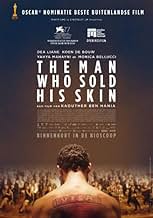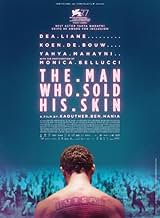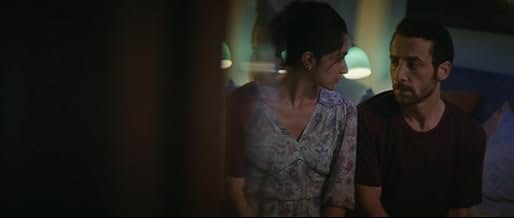NOTE IMDb
6,9/10
7,5 k
MA NOTE
Le voyage de Sam Ali, un Syrien qui a fui au Liban pour échapper à la guerre, dans l'espoir de rejoindre l'amour de sa vie à Paris.Le voyage de Sam Ali, un Syrien qui a fui au Liban pour échapper à la guerre, dans l'espoir de rejoindre l'amour de sa vie à Paris.Le voyage de Sam Ali, un Syrien qui a fui au Liban pour échapper à la guerre, dans l'espoir de rejoindre l'amour de sa vie à Paris.
- Réalisation
- Scénario
- Casting principal
- Nommé pour 1 Oscar
- 9 victoires et 12 nominations au total
Koen De Bouw
- Jeffrey Godefroi
- (as Koen de Bouw)
Avis à la une
Greetings again from the darkness. Lao Tzu wrote, "Being loved deeply by someone gives you strength, while loving someone gives you courage." But to what extreme would you go for true love, and how far is too far? Writer-director Kaouther Ben Hania offers an early scene on a commuter train as Sam Ali and Abeer flirt and tease to the point that he publically, and loudly, proclaims his love for her. Unfortunately for him, his outburst occurs in Syria, where human rights are always in peril. In fact, this love story is burdened with the weight of human rights, individual choices, and the power of art.
Ms. Ben Hania bookends her film with a choreographed art installation coated in a blizzard of white walls and white gloves. It's 2011, when a distant relative in law enforcement assists Sam Ali (Yahya Mahayni) with his (quite creative) escape from Syria to Lebanon - after a painful slap of reality accompanies Sam's goodbye to his beloved Abeer (Dea Liane in her first screen credit). As Sam flees for his life, Abeer is pressured by her family into an arranged marriage.
We then flash forward one year to find Sam working in a Beirut chicken factory. He scrounges for food at the buffet of local art galleries until one day he is spotted by Soraya (a blond Monica Bellucci), the agent for acclaimed artist Jeffrey Godefroy (Koen De Bouw). When Sam and Godefroy meet, the artist tells him that art is "alive" and, more precisely, "I want your back". A Faustian deal is cut. Godefroy turns Sam Ali into a living piece of art by tattooing his back, and Sam gets the travel visa he desperately needs to reunite with Abeer.
With Sam basically a commodity (there are even T-shirts of his back in the gift shop), there are protests to his being exploited - this despite Sam enjoying the nice hotels, room service, and promise of the visa. Of course, as with any commodity, it's only a matter of time before the almighty dollar comes into play, and soon Sam is auctioned off to a collector. Subtle humor has a role throughout much of the film, and Mr. Mahayni is quite believable as a Syrian refugee sacrificing for love. Ms. Ben Hania's film is inspired by "Tim", an original artwork tattoo by Wim Delvoye sold to a collector in 2008. Mr. Delvoye, a controversial Belgian artist, even makes a brief appearance here as an insurance agent. This is a thought-provoking love story, survival tale, and commentary on the bent side of the art world. When is a man truly free? We don't typically think of Tunisia as a hotbed for cinema, but this film deserves attention.
Ms. Ben Hania bookends her film with a choreographed art installation coated in a blizzard of white walls and white gloves. It's 2011, when a distant relative in law enforcement assists Sam Ali (Yahya Mahayni) with his (quite creative) escape from Syria to Lebanon - after a painful slap of reality accompanies Sam's goodbye to his beloved Abeer (Dea Liane in her first screen credit). As Sam flees for his life, Abeer is pressured by her family into an arranged marriage.
We then flash forward one year to find Sam working in a Beirut chicken factory. He scrounges for food at the buffet of local art galleries until one day he is spotted by Soraya (a blond Monica Bellucci), the agent for acclaimed artist Jeffrey Godefroy (Koen De Bouw). When Sam and Godefroy meet, the artist tells him that art is "alive" and, more precisely, "I want your back". A Faustian deal is cut. Godefroy turns Sam Ali into a living piece of art by tattooing his back, and Sam gets the travel visa he desperately needs to reunite with Abeer.
With Sam basically a commodity (there are even T-shirts of his back in the gift shop), there are protests to his being exploited - this despite Sam enjoying the nice hotels, room service, and promise of the visa. Of course, as with any commodity, it's only a matter of time before the almighty dollar comes into play, and soon Sam is auctioned off to a collector. Subtle humor has a role throughout much of the film, and Mr. Mahayni is quite believable as a Syrian refugee sacrificing for love. Ms. Ben Hania's film is inspired by "Tim", an original artwork tattoo by Wim Delvoye sold to a collector in 2008. Mr. Delvoye, a controversial Belgian artist, even makes a brief appearance here as an insurance agent. This is a thought-provoking love story, survival tale, and commentary on the bent side of the art world. When is a man truly free? We don't typically think of Tunisia as a hotbed for cinema, but this film deserves attention.
The opening scene shows a framed item being hung in a stark white exhibition space. We're then greeted to the sound of purring cat as a man stirs awake. This is, for the most part, the nearest we get to a happy scene: 'The man who sold his skin' is an excellent film, but it's not a particularly pleasant story being told.
There is an unyielding tension pervading the feature that comes from the mere knowledge of the premise, let alone seeing the narrative play out. Passing moments of levity, and the quality of the film-making craft on display, help to offset that feeling, and an accompanying melancholy, but don't truly make this easier to watch.
Yet make no mistake, 'The man who sold his skin' is a fine film, very well made. Writer-director Kaouther Ben Hania's camerawork is exquisite, with many eye-catching shots as worthy of appreciation as any piece of art in a museum. There are several instances where lens flare, or the refraction of light through glass, is used to partly obscure a shot with an artistic touch that I think often gets lost in many pictures employing the same tricks. Then, too, the music of composer Amine Bouhafa catches our attention to, perfectly complementing the scenes we see.
And the cast is outstanding. The only actor here I distinctly recognize is Monica Bellucci, whose presence is surprising but welcome, as she brings an entrancing, understated intensity to her role. I could swear I've seen Koen De Bouw in other features, though a glance at his credits suggests otherwise. Still, there's a purposefulness, and cunning, in his countenance that we can't tear our eyes away from. Above all, though, I would love to learn more about Dea Liane, and star Yahya Mahayni, whose lack of renown belies great skill. It's a joy to see them at play, and I'd love to watch more of their features.
Engrossing as Ben Hania's screenplay is, the narrative is a thinly veiled vehicle for stark themes of human rights, racism, exploitation, dehumanization, and the tricks we fool ourselves into believing in pursuit of a better life. There are some especially ugly and cringe-worthy moments on display as these notions are laid as bare as the skin on protagonist Sam Ali's back. Once more - it's undeniably captivating, but viewers looking for an uplifting flick may wish to look elsewhere.
Still, when all is said and done, the ending is a little bit shocking, yet also deeply rewarding. It's a fine capstone to a film that has explored some very murky territory, and further credit to the writing.
There's no question in my mind that 'The man who sold his skin' is well deserving of every accolade to come its way. It can be a difficult movie to watch at times, but it's so well made that it's a journey very much worth taking, and finding to watch wherever you can.
There is an unyielding tension pervading the feature that comes from the mere knowledge of the premise, let alone seeing the narrative play out. Passing moments of levity, and the quality of the film-making craft on display, help to offset that feeling, and an accompanying melancholy, but don't truly make this easier to watch.
Yet make no mistake, 'The man who sold his skin' is a fine film, very well made. Writer-director Kaouther Ben Hania's camerawork is exquisite, with many eye-catching shots as worthy of appreciation as any piece of art in a museum. There are several instances where lens flare, or the refraction of light through glass, is used to partly obscure a shot with an artistic touch that I think often gets lost in many pictures employing the same tricks. Then, too, the music of composer Amine Bouhafa catches our attention to, perfectly complementing the scenes we see.
And the cast is outstanding. The only actor here I distinctly recognize is Monica Bellucci, whose presence is surprising but welcome, as she brings an entrancing, understated intensity to her role. I could swear I've seen Koen De Bouw in other features, though a glance at his credits suggests otherwise. Still, there's a purposefulness, and cunning, in his countenance that we can't tear our eyes away from. Above all, though, I would love to learn more about Dea Liane, and star Yahya Mahayni, whose lack of renown belies great skill. It's a joy to see them at play, and I'd love to watch more of their features.
Engrossing as Ben Hania's screenplay is, the narrative is a thinly veiled vehicle for stark themes of human rights, racism, exploitation, dehumanization, and the tricks we fool ourselves into believing in pursuit of a better life. There are some especially ugly and cringe-worthy moments on display as these notions are laid as bare as the skin on protagonist Sam Ali's back. Once more - it's undeniably captivating, but viewers looking for an uplifting flick may wish to look elsewhere.
Still, when all is said and done, the ending is a little bit shocking, yet also deeply rewarding. It's a fine capstone to a film that has explored some very murky territory, and further credit to the writing.
There's no question in my mind that 'The man who sold his skin' is well deserving of every accolade to come its way. It can be a difficult movie to watch at times, but it's so well made that it's a journey very much worth taking, and finding to watch wherever you can.
"The Man Who Sold His Skin," Tunisia's first ever International Feature Film nominee at the Academy Awards, reminded me a lot of the movie "Synonyms" from last year. Both are about men who have been exiled from their countries of origin -- in one the man is a Syrian refugee, in the other a young man self exiles himself from the oppressive military culture of Israel. In both films, the men find themselves turned into commodities by their adopted countries, welcomed only as much as they can prove themselves to be useful. I liked both films quite a lot, "Synonyms" probably a bit more, but "The Man Who Sold His Skin" is quite good in its own right.
It's apparently based on a true story, though I always take that claim with a grain of salt. The man at the film's center agrees to have his entire back tattooed with a visa that allows refugees to travel freely through Europe, which turns him into a living work of art on display in museums and galleries. The lack of narrative subtlety is compensated for by a striking visual style. This film looks beautiful, nearly every scene offering the viewer composition just begging to be admired. Indeed, at times it's almost a little too beautiful, too carefully composed, as if the director just couldn't help but make choices that would draw attention to themselves. But it's a sin I can forgive when the results are a movie that looks as good as this one does.
Grade: A.
It's apparently based on a true story, though I always take that claim with a grain of salt. The man at the film's center agrees to have his entire back tattooed with a visa that allows refugees to travel freely through Europe, which turns him into a living work of art on display in museums and galleries. The lack of narrative subtlety is compensated for by a striking visual style. This film looks beautiful, nearly every scene offering the viewer composition just begging to be admired. Indeed, at times it's almost a little too beautiful, too carefully composed, as if the director just couldn't help but make choices that would draw attention to themselves. But it's a sin I can forgive when the results are a movie that looks as good as this one does.
Grade: A.
The Man Who Sold His Skin is a pretty good movie. And it's one about art that to an extent shares my feelings and opinions of it. Meaning, that I was naturally inclined to like it as soon as I understood what was going on... And I did.
But the movie comes with its own collection of flaws that are a little too big to miss. The greatest complaint I have is that the movie overall seemed aimless. Aimless in that there was no one destination the writers felt comfortable diving deep into. Rather, the movie keeps itself safe on the surface; often finding itself at the door of a sophisticated and thought provoking conflict, but hesitates entering or engaging with those questions. Another minor complaint is the ending; which after all what the movie has been about, felt a little too cheesy.
Overall, I like what the movie is about, and I'm glad I watched it. The complaints I have are not too great to prevent one from enjoying the movie.
But the movie comes with its own collection of flaws that are a little too big to miss. The greatest complaint I have is that the movie overall seemed aimless. Aimless in that there was no one destination the writers felt comfortable diving deep into. Rather, the movie keeps itself safe on the surface; often finding itself at the door of a sophisticated and thought provoking conflict, but hesitates entering or engaging with those questions. Another minor complaint is the ending; which after all what the movie has been about, felt a little too cheesy.
Overall, I like what the movie is about, and I'm glad I watched it. The complaints I have are not too great to prevent one from enjoying the movie.
"The Man Who Sold His Skin" depicts a refugee forced into an unpleasant predicament. In showing the plight of refugees, Kaouther Ben Hani's Academy Award-nominated movie also looks at the cold attitudes of supposedly highbrow individuals. The sad thing is that there are probably people in real life who have gotten subjected to this sort of thing. I recommend it.
Le saviez-vous
- AnecdotesWhile director Kaouther Ben Hania was visiting the Louvre Museum in Paris in 2012, there was a retrospective of Belgian artist Wim Delvoye. There she saw, in Napoleon III's apartments, Delvoye's Tim (2006 - 08), in which the artist had tattooed the back of Tim Steiner, who was sitting on an armchair with his shirt off displaying Delvoye's design. The piece was sold to a German art collector and Tim is contractually obliged to spend a certain amount of time, topless and sitting still, in a gallery every year. Wim Delvoye appears in the movie as the insurance guy.
- GaffesWhen Sam Ali changes his seat at the train at 05:55, the place of the man in the back seat changes each time the camera switches between Sam and Abeer.
- ConnexionsFeatured in La 93e cérémonie des Oscars (2021)
- Bandes originalesFiliae maestae Jerusalem, RV 638: I, 'Filiae maestae Jerusalem'
Music by Antonio Vivaldi (uncredited)
Conducted and Performed by Philippe Jaroussky (Audio) (p)
Performed by Ensemble Artaserse (uncredited)
2014 Erato/Warner Classics, Warner Music UK Ltd.
Meilleurs choix
Connectez-vous pour évaluer et suivre la liste de favoris afin de recevoir des recommandations personnalisées
- How long is The Man Who Sold His Skin?Alimenté par Alexa
Détails
- Date de sortie
- Pays d’origine
- Sites officiels
- Langues
- Aussi connu sous le nom de
- The Man Who Sold His Skin
- Lieux de tournage
- Sociétés de production
- Voir plus de crédits d'entreprise sur IMDbPro
Box-office
- Budget
- 2 230 000 € (estimé)
- Montant brut mondial
- 227 290 $US
- Durée1 heure 44 minutes
- Couleur
- Mixage
- Rapport de forme
- 2.39 : 1
Contribuer à cette page
Suggérer une modification ou ajouter du contenu manquant

Lacune principale
What is the Hindi language plot outline for L'Homme qui a vendu sa peau (2020)?
Répondre




























